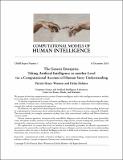The Genesis Enterprise: Taking Artificial Intelligence to another Level via a Computational Account of Human Story Understanding
Author(s)
Winston, Patrick Henry; Holmes, Dylan
DownloadCMHI-Report-1.pdf (2.143Mb)
Metadata
Show full item recordAbstract
We propose to develop computational accounts of human intelligence and to take intelligent systems to another level using those computational accounts.
To develop computational accounts of human intelligence, we believe we must develop biologically plausible models of human story understanding, and then use those models to implement story-understanding systems that embody computational imperatives.
We illustrate our approach by describing the development of the Genesis Story Understanding System and by explaining how Genesis goes about understanding short, up to 100-sentence stories, expressed in English. The stories include, for example, summaries of plays, fairy tales, international conflicts, and Native American creation myths.
Genesis answers questions, interprets with controllable allegiances and cultural biases, notes personality traits, anticipates trouble, measures conceptual similarity, aligns stories, reasons analogically, summarizes, tells persuasively, composes new stories, and performs story-grounded hypothetical reasoning.
We explain how we ensure that work on Genesis is scientifically grounded; we identify representative questions to be answered by our Brain and Cognitive Science colleagues; and we note why story understanding has much to offer not only to Artificial Intelligence but also to fields such as business, economics, education, humanities, law, neuroscience, medicine, and politics.
Date issued
2018-12-15Series/Report no.
;1
Keywords
computational models of human intelligence, story understanding, computational imperatives, inference reflexes, concept recognition, Genesis story-understanding system